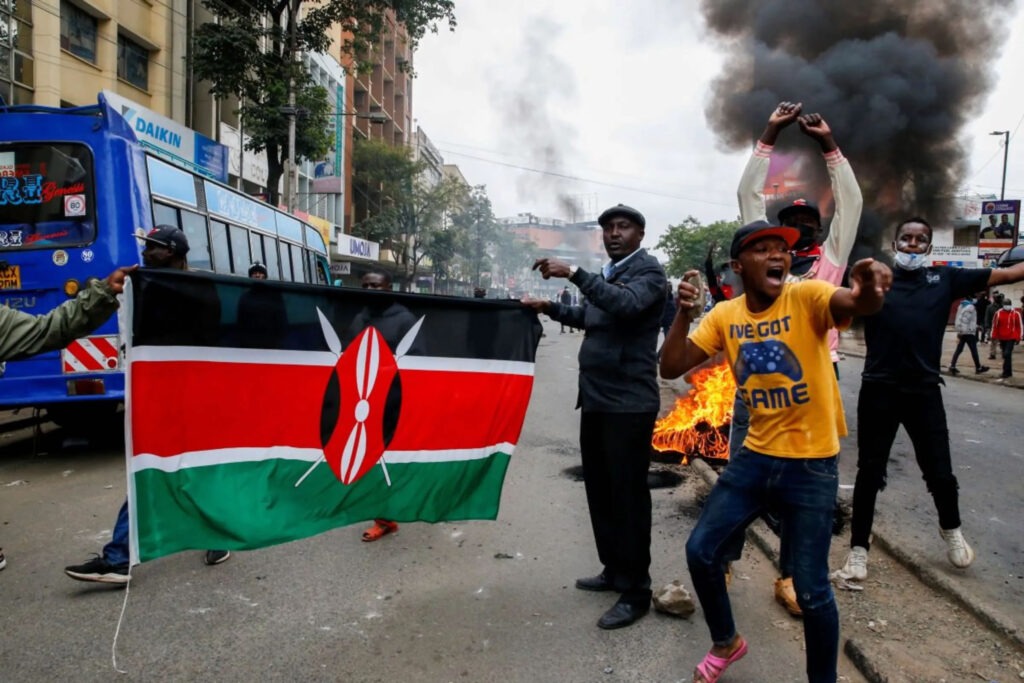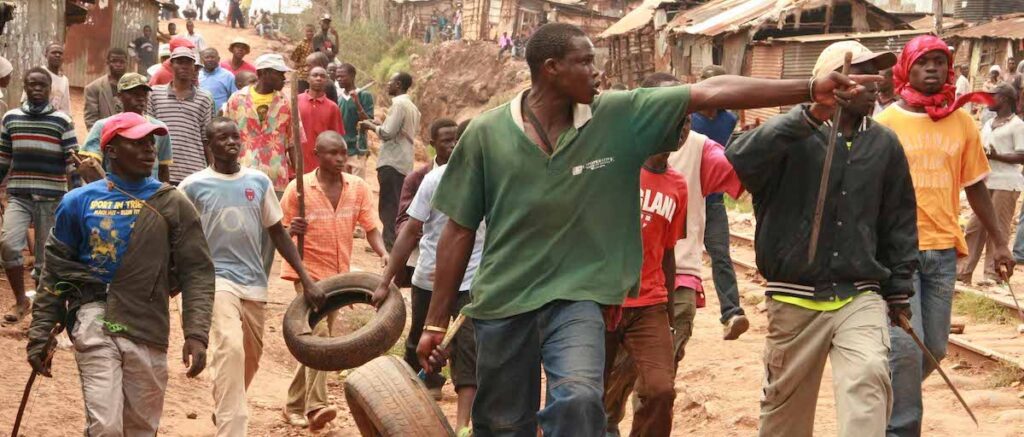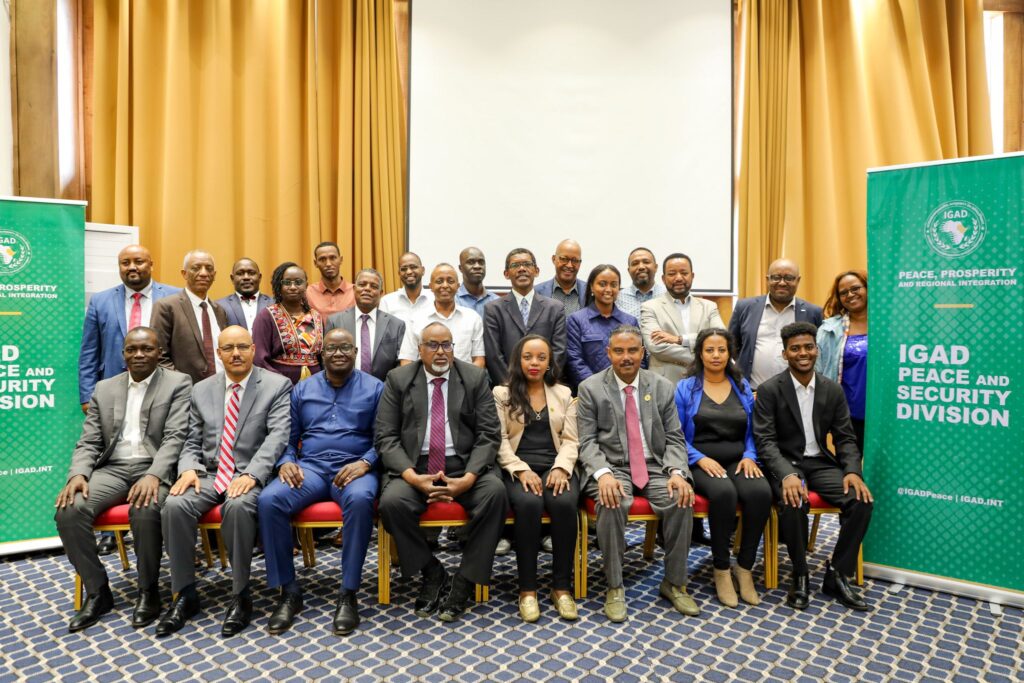
1.0 Introduction
Democracy in Eastern Africa faces an escalating threat from political goons, hired thugs mobilized to disrupt protests,political activities, intimidate citizens, and consolidate power. Countries including Kenya, Uganda, Ethiopia, Tanzania, South Sudan, Sudan, the Democratic Republic of Congo, and other eastern Africa countries have experienced episodes where elite-backed violence undermines governance, displaces populations, and destroys livelihoods (Human Rights Watch, 2025; Amnesty International, 2025). Politicians, influential business actors, and, at times, state officials strategically deploy these actors to enforce agendas, weaken opposition, and instill fear. The consequences are killings, abductions, looting, and property destruction, which erode public trust and threaten the rule of law (UNDP, 2025). This commentary examines the systemic deployment of goons as a direct challenge to the future of democracy in Eastern Africa, highlighting their use during the quelling of 2024 Kenyan Gen Z protests, Uganda’s electoral crackdowns, Ethiopia’s federal conflicts, and cross-border violence in Eastern Africa. Comparative lessons from Haiti’s gang-driven political instability will inform regional understanding. The commentary aims to guide policymakers, civil society organizations, and regional bodies on dismantling networks of hired violence, protecting electoral integrity, and safeguarding human rights. Ultimately, without decisive intervention, goonism risks institutionalizing violence as a primary instrument of governance, undermining future democratic norms across the region.
2.0 Key Issues
2.1. Goonism as an Electoral Weapon

Elections in Eastern Africa are increasingly manipulated through the strategic deployment of goons. In Kenya, the 2007–2008 post-election violence left over 1,100 dead and 600,000 displaced, as Mungiki and other militia groups terrorized opposition strongholds (Human Rights Watch, 2008). During the 2024 Gen Z protests crackdown, armed groups, allegedly elite-backed, carried out abductions, vandalism, and intimidation. Uganda’s 2021 elections showcased “crime preventers” suppressing dissent (Amnesty International, 2025). In Ethiopia, informal militias in Oromia and Amhara enforced party loyalty and silenced opposition (Erba,2024). Beyond immediate outcomes, these activities normalize political violence, weaken civil institutions, and compromise democratic legitimacy. Goons instill fear, reduce voter participation, destroy property, and perpetuate cycles of retributive violence. Haiti’s gang-driven political instability illustrates how organized, elite-backed violence entrenches corruption and lawlessness, offering a cautionary parallel for Eastern Africa (Bleus, 2025). Ultimately, elections shift from contests of ideas to contests of coercion, undermining citizens’ ability to freely determine political outcomes and hence undermining the democratic space.
2.2. Youth Unemployment and the Goon Economy
Eastern Africa’s youth bulge and pervasive unemployment fuel the recruitment of political goons. Over 70% of the population is under 30, with urban and peri-urban areas offering few legitimate opportunities (World Bank, 2024). In Kenya, slums such as Kibera and Mathare are fertile grounds for recruitment, where youth are incentivized with money, alcohol, or false employment promises (Carter Center, 2022). Uganda’s paramilitary-style youth groups replicate similar dynamics, embedding goonism within the political marketplace (ILO, 2025). Idle, disenfranchised youth become disposable instruments for political elites, engaging in killings, property destruction, and intimidation to secure votes or suppress protests. Similar patterns occur in South Sudan and Sudan, where youth militias amplify ethnic tensions and disrupt civic life. Without addressing structural unemployment and social exclusion, political actors can continue exploiting vulnerable youth. This undermines democratic norms and risks radicalizing young populations toward extremist or criminal networks, perpetuating cycles of violence across national borders, and weakening regional stability.
2.3. State Complicity and Elite Capture
The persistence of goonism reflects both state complicity and elite capture of democratic institutions and processes. In Kenya, outlawed groups such as Mungiki, Sungu Sungu, and other urban militias are often mobilized with tacit political and law enforcement approval (International Crisis Group, 2025). In Ethiopia, federal and regional authorities deploy local militias to enforce party loyalty, often turning a blind eye to human rights abuses. Uganda’s “crime preventers” operate with state sanction to suppress opposition (Amnesty International, 2025). Police frequently fail to intervene, signaling implicit support and eroding public trust. Political elites benefit from chaos, leveraging goons to weaken opposition, intimidate voters, and seize property or resources. Unless accountability mechanisms are enforced, elite complicity ensures the survival of goonism, institutionalizing violence and undermining democratic consolidation across the region. Reforming institutions and enforcing the law is therefore critical to dismantle networks of hired violence and restore democratic norms.
2.4. Goonism and Regional Security Spillovers
Political goons in Eastern Africa pose threats beyond national borders. Kenya’s northern and coastal regions show overlap between electoral goons and violent extremist networks, complicating counterterrorism efforts (UNDP, 2025). Uganda’s electoral crackdowns trigger refugee flows into South Sudan and Tanzania, straining fragile host communities. In Sudan and the Democratic Republic of Congo, political militias cross borders to intimidate, loot, or enforce agendas, undermining regional security. The proliferation of goons weakens the East African Community (EAC) and the African Union (AU) in promoting peaceful elections and democratic norms (Musoi, 2025). Like Haiti, where gangs manipulate elections and destabilizes urban areas, Eastern Africa shows that elite-backed violence disrupts economies, education, and health systems. Regional integration and trade initiatives falter when political instability is weaponized. Goons constitute a transnational threat to human rights, democratic legitimacy, and social cohesion, making regional coordination essential.
2.5. Human Rights and the Erosion of Democracy
Goons threaten citizens’ fundamental rights across Eastern Africa. Targeted killings, abductions, and property destruction accompany politically motivated attacks, infringing on rights to life, security, and political participation (Human Rights Watch, 2025; UNDP, 2023). Places of worship, schools, and public spaces have been infiltrated by militias during funerals, weddings, or protests, terrorizing civilians and curtailing assembly and expression. Violence is deliberately used to manipulate elections, suppress dissent, and intimidate communities, hence undermining democratic governance. Elites exploit weak institutions to maintain impunity, creating environments where fear eclipses civic engagement. Unless measures are taken to uphold human rights, prosecute perpetrators, and reform state institutions, democracy risks being hollowed out, leaving populations vulnerable to coercion and exploitation. Protecting civil liberties and strengthening institutions is therefore critical to preserve democratic governance across Eastern Africa.
3.0 Conclusion
Political goons are a systemic threat to democracy, governance, and human rights in Eastern Africa. Elite-backed deployment of goons to kill, intimidate, and destroy property undermines elections, erodes public trust, and destabilizes states. If unchecked, goonism normalizes violence as a tool of governance, reversing democratic gains and enabling authoritarianism. Lessons from Kenya, Uganda, Ethiopia, and Haiti show that coordinated interventions in policing reform, youth inclusion, elite accountability, regional security cooperation, and human rights protection are essential. Multilevel action can safeguard elections, protect citizens, and reinforce democratic norms. Combating goonism is critical to sustaining peace, democracy, and development across the Eastern Africa region. Failure to act risks embedding coercion as a permanent political tool, threatening regional stability, citizen welfare, and democratic governance.
4.0 Policy Recommendation
4.1. Electoral Integrity and Policing Reform
Eastern Africa states must establish independent electoral security units to counter the deployment of goons during elections (Electoral Integrity Project, 2024). Police forces should undergo depoliticization, professionalization, and accountability reforms to prevent complicity. Real-time monitoring tools, including digital mapping of hotspots, should anticipate and respond to violence. International and regional observers must prioritize early-warning frameworks and report violations publicly. Civil society organizations should coordinate community-based protection initiatives, while governments criminalize the hiring and deployment of goons with strict penalties. These reforms will protect voters, safeguard property, and reduce politically motivated killings. Strengthening electoral security ensures that elections reflect genuine citizen choice rather than coercion, hence supporting democratic consolidation.
4.2. Youth Inclusion and Economic Pathways

Tackling the “goon economy” requires addressing structural youth unemployment. Governments, civil society, and the private sector must expand job creation in digital innovation, renewable energy, and vocational trades (ILO, 2025). Sports-for-peace programs, civic education, and entrepreneurship initiatives can redirect youth from violent recruitment. Mentorship and microfinance opportunities should target urban slums and rural areas, which are vulnerable to recruitment. By providing meaningful alternatives, political elites lose leverage over vulnerable populations. Regional cooperation through AU and EAC youth programs can harmonize efforts across borders. Empowered youth reduce the labor pool for goons, decrease election-related violence, and strengthen democratic participation. Long-term inclusion supports sustainable peace and governance.
4.3. Elite Accountability and Legal Enforcement
Political elites who hire goons must face accountability. The AU, EAC, and domestic judicial systems should establish clear sanctions, criminal prosecution, and asset freezes for violators (Amnesty International, 2025). Anti-corruption agencies must act impartially to dismantle networks financing violence. Civil society coalitions should lead transparency campaigns, documenting abuses and naming perpetrators. International partners should condition aid and electoral support on demonstrable reforms. Judicial independence is critical to enforce penalties, deter elite impunity, and protect citizens’ rights. Accountability dismantles goon networks, strengthens democratic institutions, ensures human rights protection, and curbs cycles of politically motivated violence. Clear enforcement signals that coercion is unacceptable, reinforcing the rule of law and citizen trust in governance.
4.4. Regional Security Cooperation

Addressing cross-border goonism requires coordinated regional security strategies. EAC and AU mechanisms should monitor militia movements, harmonize border policing, and establish rapid response units for electoral violence (UNDP, 2023). Intelligence-sharing, joint patrols, and early-warning systems prevent escalation of politically motivated attacks. Refugee-hosting states must integrate displaced populations into protection frameworks to reduce exploitation by armed groups. Diplomatic pressure should target external actors funding militias. Regional collaboration reinforces democratic norms, mitigates transnational threats, and protects human rights. Effective cooperation ensures elections do not trigger mass displacement, killings, or property destruction. Harmonized strategies strengthen regional stability, safeguard citizens, and uphold democratic processes, limiting goons as transnational instruments of coercion.
4.5. Human Rights and Civic Protection
Governments and civil society must prioritize human rights to counter gun-induced violence. Legal frameworks should criminalize killings, abductions, and property destruction by political militias (Human Rights Watch, 2025). Safe zones for worship, education, and civic assembly must be enforced during elections. Public awareness campaigns can educate citizens on rights and reporting mechanisms. Civil society, in partnership with the media, should document abuses in real time. International human rights bodies must monitor elections and impose sanctions for violations. Protecting human rights strengthens democracy, reduces fear-based governance, and ensures citizens participate freely in elections without threats of violence or intimidation. A rights-based approach safeguards civic space, reinforces accountability, and fosters long-term democratic resilience in Eastern Africa.
5.0 References
Amnesty International. (2025). Annual report on Eastern Africa: Human rights under threat. Amnesty International.
Bleus, R. (2025). Victimized by Gang Violence: A Phenomenological Study of Haitian Migrants (Doctoral dissertation, St. Thomas University).
Carter Center. (2022). Election observation report: Kenya’s 2022 general elections. The Carter Center.
Electoral Integrity Project. (2024). Electoral integrity in Africa: Trends and challenges. University of Sydney.
Erba, S. H. (2024). Amhara, Oromo, and Tigray political cultures and challenges of political stability in Ethiopia: 1991–2017 (Doctoral dissertation, University of the Western Cape).
Human Rights Watch. (2008). Ballots to bullets: Organized political violence and Kenya’s crisis of governance. Human Rights Watch.
Human Rights Watch. (2025). Eastern Africa: Democracy under siege. Human Rights Watch.
International Crisis Group. (2025). Militias, politics, and democracy in Eastern Africa. International Crisis Group.
International Labour Organization (ILO). (2025). Youth employment in Africa: Addressing vulnerabilities and opportunities. International Labour Organization.
Musoi, M. (2025). Organized Criminal Gangs and Insecurity in Nairobi City County, Kenya (Doctoral dissertation, Kenyatta University).
United Nations Development Programme (UNDP). (2023). Regional security and democratic governance in Africa. UNDP.
United Nations Development Programme (UNDP). (2025). Human development report: Governance, security, and resilience in Eastern Africa. UNDP.
World Bank. (2024). Youth bulge and unemployment in Sub-Saharan Africa. World Bank.
